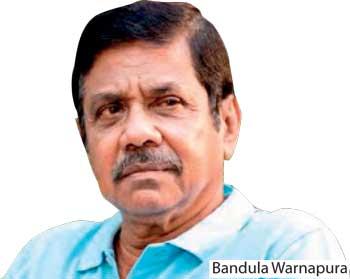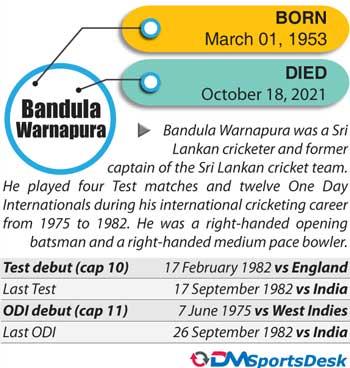27 Dec 2021 - {{hitsCtrl.values.hits}}
 By Lakshman Ranasinghe
By Lakshman Ranasinghe
Sri Lankan cricket fans were saddened on receiving the news of the passing away of a much-loved cricketer, a captain, an administrator and an advisor.
It was none other than the demise of Bandula Warnapura. A proud product of Nalanda College, Bandu came to the limelight as a highly talented cricketer, and every lover of the game was sure that he would don the national blazer very soon. He represented the Sri Lanka Schools cricket team that toured India, heading the batting average with 56.71 and his proudest moment in his school career was when he lowered the series batting record of Ananda-Nalanda (111 n.o.) held by P.M. Jayatilleke that stood for 44 years in 1971, scoring 118 n.o.
After leaving school, Bandu represented Bloomfield C & AC, captaining the club in the premier cricket tournament in Sri Lanka. Under his captaincy, Bloomfield won the Saravanamuttu Trophy for several years, as well as other limited-overs tournaments. He was the president of the club at the time of his death.
Bandu was employed at Bloomfield by the late Shelley Wickremasinghe, where he came under the fatherly figure of Wickremasinghe as he provided Bandu with employment and was sent to England to play league cricket for Layland Cricket Club. A man who never forgot his past, he contributed to Nalanda College and Bloomfield C&AC at every possible opportunity with the idea of uplifting the standard of cricket. He spent hours at Nalanda and at the club giving valuable advice to the young cricketers.
Representing the Board President’s XI and the national team, Bandu was involved in many huge opening partnerships. The brightest spot in his cricket career was the century he scored against the touring Australians under Kim Hughes in an ODI at the SSC Grounds in 1981. He led Sri Lanka at the inaugural Test match against England in 1981.
 The writer had the privilege of working together with Bandula as the Asst. Cricket Secretary of the club when he led the side on many occasions. His vast knowledge of the game would have done a lot for Sri Lankan cricket if he had been given a deserving position. Bandu took a keen interest in handling practices. On his advice, Bloomfield became the only club in the island for all three divisions, Div. I, II, and III, to practice together. This gave Div. III cricketers, mostly schoolboys, the opportunity to face top-tier national bowlers and bowl at a large number of national cricketers.
The writer had the privilege of working together with Bandula as the Asst. Cricket Secretary of the club when he led the side on many occasions. His vast knowledge of the game would have done a lot for Sri Lankan cricket if he had been given a deserving position. Bandu took a keen interest in handling practices. On his advice, Bloomfield became the only club in the island for all three divisions, Div. I, II, and III, to practice together. This gave Div. III cricketers, mostly schoolboys, the opportunity to face top-tier national bowlers and bowl at a large number of national cricketers.
Bandu was a gentleman par excellence, other than a cricketer, who was always ready to give a helping hand to anyone who sought his advice and help. A straightforward man who was never a “yes sir, no sir man.” He speaks with an open mind and never hides anything. If he sees something wrong, he says it right in the face. A man of guts bears evidence when he was hit on the head by a West Indian fast bowler, was unconscious for several hours, and was seen on the field several months later.
Given a responsibility, he wanted to complete the task or project at his best. He was given the task of building new grounds at Batticaloa. Bandu chose to stay in a container as his office and room, without using the hotel room he was given. He wanted to see the development of the job with his own eyes and give instructions to the workforce to achieve a lush, green, top-class environment.
This strict disciplinarian was a leader on the field, but he was also a good friend off the field. He never interferes with other people’s duties. I have never come across Bandu instructing the then groundsman of Bloomfield, Omar Deen, to prepare wickets to suit his batters or bowlers. He was sure that his all-round side was capable of playing on any type of wicket. Thousands of supporters flocked to see Bloomfield in action. The spectators were Bandu’s good friends, and Bandu always treated them with a smile or a word.
Bandu kept the team together, and that was the very reason that the club at Reid Avenue was at the top. At the end of a day’s play, Bandu would speak to the players and plan for the next day’s play. This practice is not to be seen these days. He was like an elder brother to the younger players and always looked after them well. He always stood by the side of his team members.
Bandu’s illustrious career ended prematurely with the participation of the rebels in South Africa in 1982. Though his talents as a cricketer, administrator, coach and commentator were not recognised in Sri Lanka, the ICC appointed him as the Development Manager for the Asian Region.
Bandu’s two sons, Madura and Madawa, followed in their father’s footsteps, captaining Nalanda College.
The name of Bandula Warnapura will remain in the hearts of every cricketer and fan, and everyone is confident that he will bloom in any field.
28 Nov 2024 1 hours ago
28 Nov 2024 1 hours ago
28 Nov 2024 2 hours ago
28 Nov 2024 4 hours ago
28 Nov 2024 5 hours ago